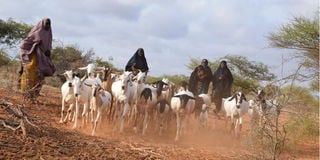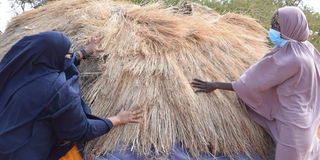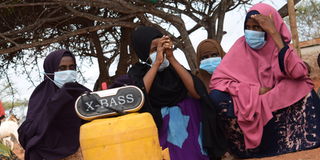The Kenyan women resisting al-Shabaab’s war on Covid-19 vaccines

Women herding their goats in Nunow village, Garissa County.
Nunow, Kenya - In a desolate, windswept corner of northern Kenya, pastoralist communities live in fear of attacks by Al Shabaab militants operating just over the border in Somalia.
Already armed with guns, grenades and machetes, the Islamist group has a new weapon: misinformation around the Covid-19 pandemic and the vaccine developed to defeat it.
But the women in these communities are fighting back.
Combining human and camel power, the Alinjughur Women’s Association and other groups like it are dismantling the coronavirus falsehoods spread by Al Shabaab and preparing to distribute the Covid-19 vaccine.
It’s a task they must undertake alone.
“We are used to gunfire sounds and explosions coming from the other side of the border. They do it day and night and I think it’s from their (Al-Shabaab) training camps,’’ says Bishara Ahmed, who comes from the flashpoint border town of Amuma, which is now virtually abandoned.
Al Shabaab militants have targeted non-Somali communities and government workers living in remote areas of northern Kenya. Health workers who came from outside the area have long since fled their remote outposts for fear of attack, abduction and even beheadings.
This has left the region’s pastoralist communities – who like generations before them herd camels and goats across these arid borderlands – to fend for themselves in the face of a pandemic.
Breaking down cultural barriers in these conservative, ethnic Somali communities, it is women who have taken up the challenge.
“We came together because all our health facilities were closed due to the Al Shabaab menace and they feed the border towns with fake information on the Covid-19 vaccine,’’ says Amina Roble, a member of the association in the village of Alinjughur.

Ms Bishara Ahmed milking her goats at the border village of Amuma.
Vaccination centre
Other women association members living in nearby Abdisamet village have worked to convert a disused health facility into a vaccination centre.
“We sat down as women in Abdisamet village when we realized Al Shabaab wanted us to refuse the vaccine so that we would die en masse and they could use our land for their selfish terrorist activities. We said no,” says Aday Ibrahim, her head covered in a dark red abaya and a surgical mask over her mouth.

Ms Fatuma Ahmed, an activist from Alinjughur, assisting other women in putting up traditionally made thatches on the proposed Covid-19 vaccination centre in Nunow, Garissa.
Their campaign has the support of the authorities in Garissa County.
“We appreciate the women’s role in undertaking Covid-19 education and Covid-19 vaccine promotion in the border region,” says Mohamed Salat, Director of Preventive and Promotive Health Services in Garissa County.
“Under the County government stakeholders approach , we are ready to partner with the women in remote areas and explore ways of expanding their work and initiatives on Covid-19 vaccination education and promoting containment measures,” he adds.
Rumours
False rumours fly like sparks in remote areas of northern Kenya, where the ethnic Somali population, with a strong oral tradition, relies on radio and telephone for information and updates.
Widespread misinformation relayed in phone messages was spread by Al Shabaab sympathisers and their secret cells operating in Garissa, Wajir and Mandera counties, local people say.
The militants have started whispers claiming the Covid-19 vaccine is a weapon to eradicate Muslims, contains pig products, would sterilise Somali women and would infect girls with promiscuous habits.
The women-led fightback started in Alinjughur after the women sat down to discuss what they had heard.
“We met despite resistance from elders who questioned our role in fighting misinformation and telling the truth about the Covid-19 vaccine,” says Ebla Ahmed, a member of Alinjughur Women’s Association.
They decided to use radio to reach border towns and to counter the vaccine deniers and fake news spreaders living across in Garissa County, where dirt roads crisscross endless dusty plains dotted with spiky desert trees.
The women purchased a solar-powered radio to replace their battery-powered one, cheaper to maintain in a region where electricity is scarce.
“We realised that radio was going to give us the best reach in educating and mobilizing other women and also countering fake news and the misinformation spreaders,” says Asli Hussein, a member of the association.

Women listen to the radio.
They went village to village with the radio to play the latest updates from medical experts, raise awareness of containment measures including social distancing, hand washing and mask wearing and to deconstruct the myths created by Al Shabaab.
The broadcasts have laid the ground for residents to accept the vaccine when it reaches Kenya’s furthest-flung regions.
“Our women went against the traditional cultural practices and came up with a solution to address Covid-19 in our border region,” said Abdi Kosar, an 81-year-old community elder from Nunow village near the Somali border.
“We had no option as elders but to join them as we saw the solution was popular and helping to counter fear and scary information.”
Vaccines
Africa has been hit by a third wave of the coronavirus with more contagious variants spiking across the continent. In western Kenya, infections are surging in Kisumu County by Lake Victoria.
To the east, across the porous border in Somalia, the government is in turmoil and struggling to cope with infections, putting the pastoralist communities on the Kenyan side at risk.
Kenya received an initial shipment of 1.1 million doses of the AstraZeneca jab from the COVAX facility in March, but in a country of 52 million people, those doses were quickly used up, says Rudi Eggars, the World Health Organisation’s representative in Kenya.
Extra COVAX doses came from South Sudan and the Democratic Republic of Congo, countries which did not have the infrastructure to distribute their vaccines doses before their expiration dates. And now bilateral donations from India, Denmark and France are also starting to arrive.
Now is the time to scale up vaccinations dramatically to head off a new wave of infections, says Mr Eggars, and that means urgently combatting vaccine misinformation.
“There are a lot of rumours and questioning of the vaccination, even among health workers and doctors – in Kenya this is a difficulty as it is across the world,” he says.
In Garissa County, authorities have received 6,000 Covid-19 vaccines. “We intend to use all means available in dispatching the Covid-19 vaccines from sub counties’ facilities to remote villages and border region,” says Mr Salat, the Garissa County health official.
Camel delivery
As the sun sets over Nunow village and the blistering heat of the day starts to subside, a group of women sit in a circle for their evening radio listening session. Some cradle babies as toddlers mill around in the dust.
They listen intently to a drama series about the pandemic and linger afterwards to discuss ideas for combatting Covid-19 in the absence of any functioning health system.
First, they plan a house-to-house campaign to engage young people, other women and crucially the village elders - whose blessing will be critical to vaccine acceptance.
Next, they decide to build a designated vaccine centre and storage depot in the village, and the next day set about constructing a herio, a traditional stick-and-thatch dome shelter, expertly weaving the grass roof so it will be water tight in the rainy season.
Once the vaccines arrive, community health workers will train the village’s traditional healers to administer the shots.
And the only way to reach the most distant communities scattered across this unforgiving landscape? By camel - the traditional means of transport that has served people in this region for centuries.
“Before Covid-19 we used a camel as an ambulance and it used to ferry patients some hundred kilometres away to main health centres in Garissa,” says Saadiya Abdullahi, a member of Nunow Women’s Association.
“With Covid-19 vaccine drive, we can use the camels to transport vaccines from one village to another and out to the water points.”
The border area, where people move unchecked across the frontier to trade and find water for their animals is still a danger zone.
Women from all the different village associations have formed an umbrella group to engage local authorities in the main town of Garissa. As well as security protection, they need the solar power systems and coolers crucial for storing the vaccine.
“We need local, regional and national assistance,” says Ms Abdullahi. “Our dream is to reach each and every member of our community with the Covid-19 vaccine.”
This story is part of the Vaccine for the World series from the Evening Standard in London





